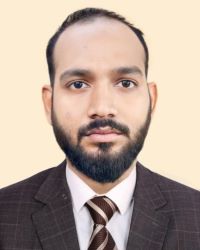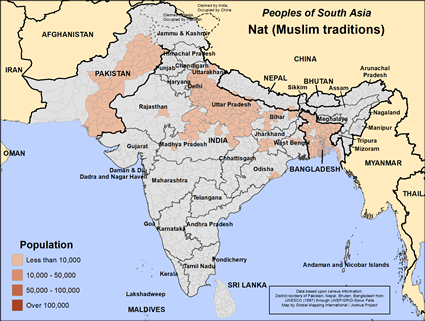Nat (Muslim traditions) in India

Photo Source:
Anonymous
|

Map Source:
People Group data: Omid. Map geography: UNESCO / GMI. Map Design: Joshua Project.
|
| People Name: | Nat (Muslim traditions) |
| Country: | India |
| 10/40 Window: | Yes |
| Population: | 139,000 |
| World Population: | 174,700 |
| Primary Language: | Hindi |
| Primary Religion: | Islam |
| Christian Adherents: | 0.00 % |
| Evangelicals: | 0.00 % |
| Scripture: | Complete Bible |
| Ministry Resources: | Yes |
| Jesus Film: | Yes |
| Audio Recordings: | Yes |
| People Cluster: | South Asia Muslim - other |
| Affinity Bloc: | South Asian Peoples |
| Progress Level: |
|
Introduction / History
The Nat or Nut peoples name is derived from the Sanskrit word nata which means dancer. They are a traditional occupational caste known for dancing and singing. The Nat have a generally lower caste status or in some states of India they are a scheduled caste. The Nat Muslim can be found in north India by the names Nar, Naitak or Natak, though a large majority of the Nat are Hindus. About 25% of Nat are Muslims. The Muslims among the Nat people live in India, Pakistan, Bangladesh, and Nepal.
What Are Their Lives Like?
As traditional dancers and acrobats that are often semi-nomadic, the Nat Muslims can still be found in acrobatic events and as singers, dancers or unskilled laborers. Men and women are known to sing and play the flute or dholak. Tattooing is common for women especially on the forehead. The Nat Muslims of Nepal speak Bhojpuri and Nepali. The Nat follow Sunni Muslim traditions and are non-vegetarian. They can be given in child marriages and nuclear families can be more common than extended families among them. The Nat Muslims tend to have a very low literacy rate.
What Are Their Beliefs?
These people are Sunni Muslims who believe that the supreme God, Allah, spoke through his prophet, Mohammed, and taught mankind how to live a righteous life through the Koran and the Hadith. To live a righteous life, you must utter the Shahada (a statement of faith), pray five times a day facing Mecca, fast from sunup to sundown during the month of Ramadan, give alms to the poor, and make a pilgrimage to Mecca if you have the means. Muslims are prohibited from drinking alcohol, eating pork, gambling, stealing, slandering, and making idols. They gather for corporate prayer on Friday afternoons at a mosque, their place of worship.
The two main holidays for Sunni Muslims are Eid al Fitr, the breaking of the monthly fast and Eid al Adha, the celebration of Abraham's willingness to sacrifice his son to Allah.
Sunni religious practices are staid and simple. They believe that Allah has pre-determined our fates; they minimize free will.
In most of the Muslim world, people depend on the spirit world for their daily needs since they regard Allah as too distant. Allah may determine their eternal salvation, but the spirits determine how well we live in our daily lives. For that reason, they must appease the spirits. They often use charms and amulets to help them with spiritual forces.
What Are Their Needs?
It is possible that the Nat Muslim in the lower castes would be open to the gospel but very few have ever tried and even fewer have worked with the Nat Muslim of India. Small business development and micro loans could likely be a big encouragement to this entrepreneurial people group.
Prayer Points
Pray for a movement of Jesus to heal and strengthen Muslim Nat communities.
Pray for the Nat people to understand and embrace that Jesus wants to bless their families and neighborhoods.
Pray for Holy Spirit anointed believers from the Muslim Nat people to change their society from within.
Pray for a movement in which the Holy Spirit leads and empowers disciples to make more disciples.